Customs
Beyond euphoria of WCO chairmanship: Stakeholders urge Nigeria to translate global Customs ascendency to reformation of Port industry
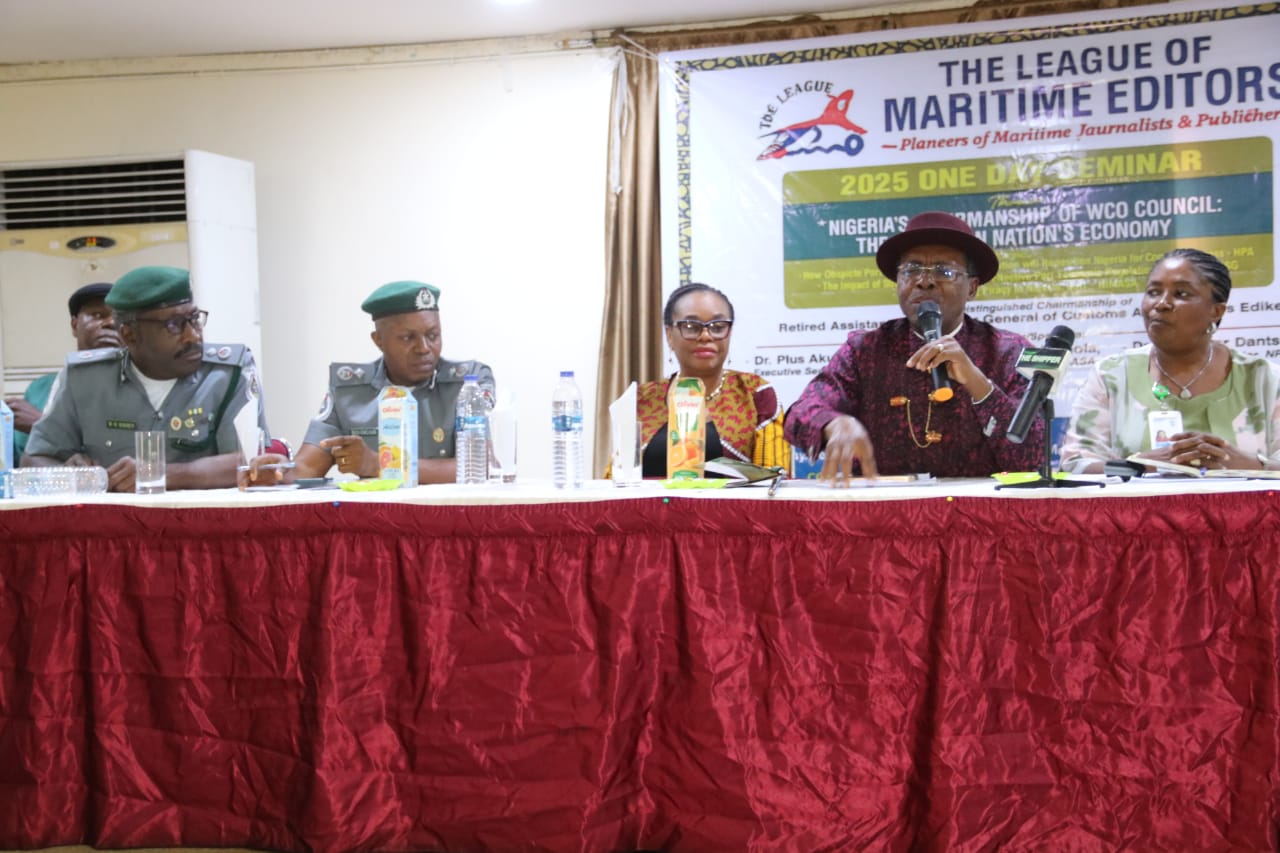
Funso OLOJO
The stakeholders at the maritime industry were firm and unanimous in their admonition that the Nigerian government should leverage the ascendency of Nigeria to global Customs top hierarchy to position the Port industry into a world player with improved port efficiency, world class infrastructure and automated port system.
It could be recalled that the Comptroller- General of Customs, Adewale Adeniyi, in June, 2025 became the first Nigerian to be elected as the Chairman of the World Customs Organization(WCO).
His historic election elicited wild jubilation and encomiums as Nigerians expressed undisguised happiness over the feat.
However, maritime experts who spoke at the one- day seminar organized by the League of Maritime Editors(LOME) in Lagos on Tuesday, September 30th,2025, warned that Nigerians should not be carried away with the historic feat.
The lead speaker, Dr Eugene Nweke, the Head of Research at Sea Empowerment and Research Center (SEREC), who spoke on the theme of the seminar “Nigeria ‘s Chairmanship of WCO Council: The Impact on Nation’s Economy” advised that the position is not a trophy to decorate the shelf but rather it was a call to duty and a rare opportunity for the country to leverage the feat to stimulate its maritime industry.
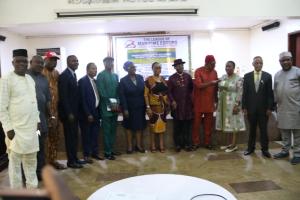
Represented by Francis Aneze-Chukwu, Dr Nweke, said the country’s new customs global status will pale into insignificance if Nigeria fails to leverage the position to improve Port efficiency, engender reforms and strengthen regulatory laws to protect legitimate trade
Addressing the gathering which cut across operators of the port industry, Nweke declared that Nigeria’s July 1, 2025 assumption of the WCO Council chair—an institution representing over 180 customs administrations and 98 percent of world trade—places the nation under an unforgiving global spotlight.
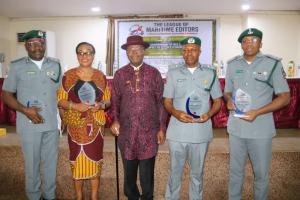
“This position is not for celebration alone; it is power to influence customs standards and champion Africa’s trade future. Leadership without domestic discipline is hollow,” he said.
He warned that despite Customs generating ₦1.3 trillion in the first quarter of 2025, port congestion and inefficiencies continue to drain an estimated $4 billion annually.
Nweke outlined six key reforms under Comptroller-General of Customs Bashir Adewale Adeniyi—Time Release Studies, data-driven inspections, advance ruling applications, the Authorized Economic Operator programme, the B’Odogwu single-window migration, and rapid cargo scanners—as the springboard to leverage Nigeria’s WCO status, but cautioned that infrastructure decay, policy flip-flops and entrenched bureaucracy could erode the gains.
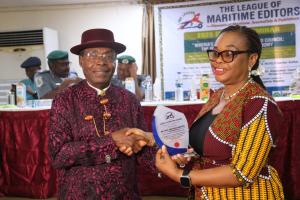
Turning his focus to the media, he charged maritime journalists to “educate, interrogate and shape narratives” rather than indulge in “undue praises that make us a collective ridicule,” urging them to become professors of the maritime space and watchdogs of reform.
The Executive Secretary of the Nigerian Shippers’ Council (NSC), Dr. Akutah Pius Ukeyima, who was also represented by Mrs Margaret Ogbonna, Director Regulatory Services department, insisted that Nigeria’s international leadership must be matched by “strong, clear and enforceable laws” to regulate ports and protect shippers.
He called for the urgent passage of the Nigerian Port Economic Regulatory Agency Bill to give the NSC a statutory mandate to curb monopolies, enforce competition and end opaque concession renewals.
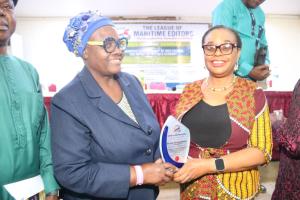
“The world is watching Nigeria, and credibility abroad will only be matched by credibility at home,” he warned.
The former General Manager of Public Affairs at the Nigerian Ports Authority (NPA), Capt. Iheanacho Ebubeogwu, reminded the gathering that the Customs Service remains the frontline enforcer of border laws and the first symbol of government authority at every port.
“For us who are professionals, the rest of you can look at the signboards and say NPA ports, but we insiders know it is first a customs area.
“That is where customs enforce all border fiscal regulations, demonstrate trade facilitation, and show that they can attract foreign investment,” he said.
While congratulating the Comptroller-General on his global appointment, Ebubeogwu warned that the WCO Council is a “salad of interests—country interests, regional interests, diplomacy and politics,” and urged stakeholders to rally behind Adeniyi to protect Nigeria’s and Africa’s stake in the organization.
He called on the maritime press to “manage his image and talk up his reputation” so that Nigeria’s tenure at the WCO strengthens the nation’s profile rather than diminishes it.
Earlier in her welcome address, President of the League of Maritime Editors, Mrs. Remi Itie, described Adeniyi’s election as “a historic moment for Nigeria” and a clear signal of the country’s growing influence in global customs affairs.
She noted that as WCO chair, Adeniyi now provides strategic leadership to the global customs agenda on trade facilitation, revenue optimization, security, and digital transformation.
But she challenged participants to go beyond celebration and interrogate how this elevation will “boost the nation’s growth index and possibly change the narrative concerning Nigeria’s trade and image abroad.”
Calling on government to harness the country’s maritime potential to create jobs for Nigeria’s vast youth population, Itie urged coastal states to look beyond federal allocations and invest in maritime opportunities such as seafaring, fishing, agro-tourism and coastal security.
“We cannot run away from global trade,” she said. “Nigeria has the natural resources to create more jobs through the nation’s maritime potentials.”
The speakers and stakeholders agreed that Nigeria’s WCO chairmanship offers a rare chance to align with global best practices on customs governance and trade facilitation.
But they stressed that prestige alone will not cut cargo dwell times that still average 20–25 days—among the worst in West Africa—nor end the corruption and inefficiency that cost traders billions.
“Let Customs deliver, let industry comply, and let the press profess,” Nweke charged.
The speakers were unanimous in their conviction and submission that Nigeria’s new global customs power is a weapon.
They believed that without decisive reforms, strong laws and relentless enforcement, the global recognition will remain an unused sword while the nation’s ports will continue to wallow in inefficiency and corruption.
The event witnessed presentations of awards to deserving industry players such as the Managing Director of Nigerian Ports Authority (NPA), Dr Abubakar Dantsoho, the Executive Secretary of Nigerian Shippers Council NSC Barrister Pius Akutah, the Controller of Lagos A Federal Operations unit of Nigeria Customs Service, Comptroller MS Shuaibu.
Others were the Tin Can Island Customs Area Controller, Comptroller Frank Onyeka, the Assistant Comptroller- General Babatunde Olomu and the Director General of Nigerian Maritime Administration and Safety Agency NIMASA, Dr Dayo Mobereola.
Charles Edike, a retired Assistant Comptroller-General of Customs(ACG) presided over the event.
Continue Reading
Customs
Customs collects N1.585 trillion from 51 compliant traders under AEO programme
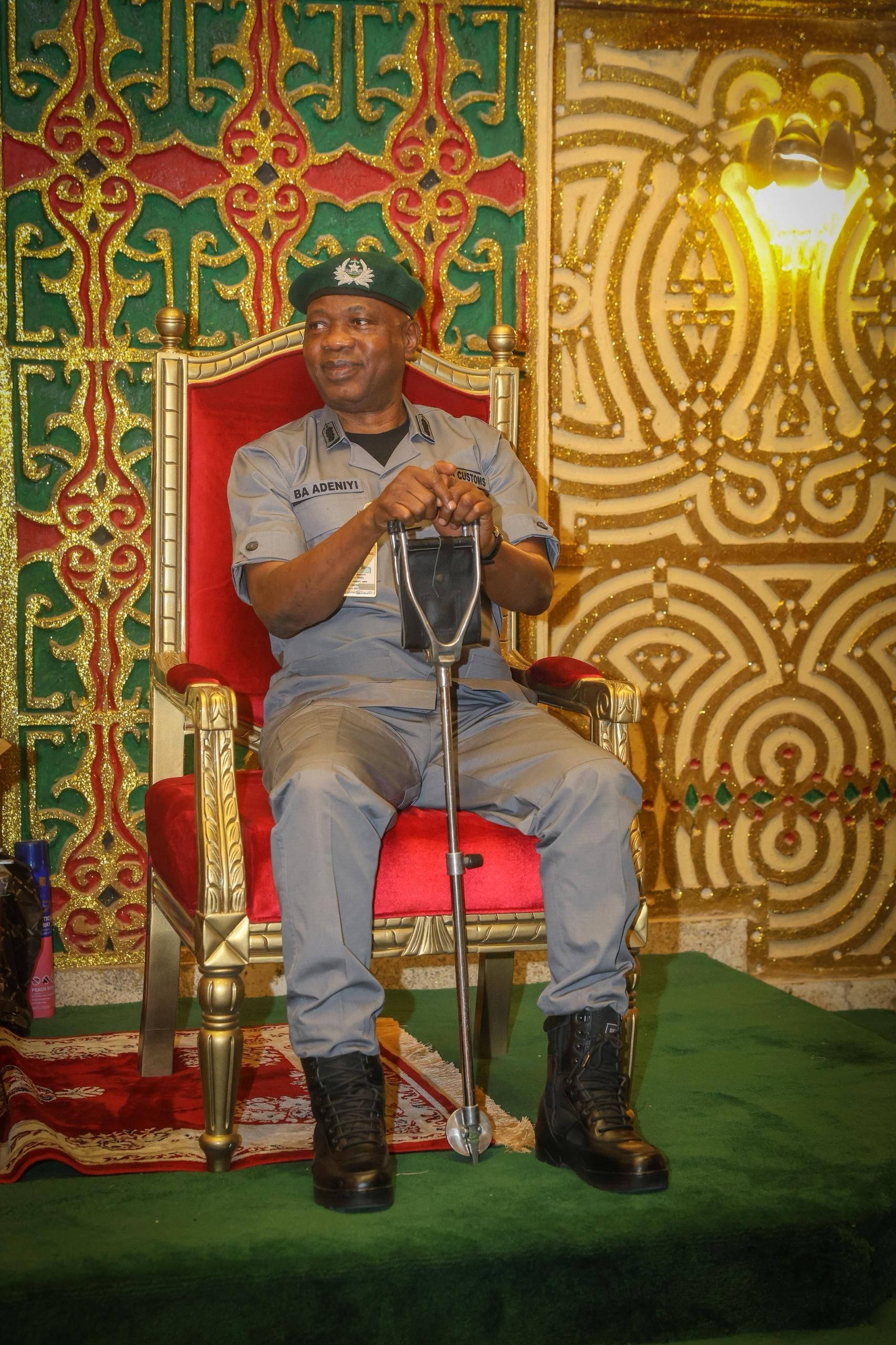
Funso OLOJO, Editor
The Authorized Economic Operator (AEO), one of the trade facilitation tools introduced by the Nigeria Customs Service in 2025, has begun to yield bountiful harvests with the revenue growth of ₦362.79 billion recorded in 2025.
According to the AEO scorecard released by the Service, the facilitation tool grossed the sum of N1.585 trillion after certification, an increase revenue from N1.222 trillion before certification.
This represents the growth of N362.79 billion(29.68 per cent) for 51 AEO – certified entities as at October, 2025.
The Programme, according to the NCS, also contributed 21.77% to its total revenue collection of ₦7.281 trillion in 2025, while customs duties paid rose by 85.66% due to enhanced compliance and increased volumes of legitimate trade.
According to AEO Monitoring and Evaluation (M&E) Report, the Programme achieved an average compliance rate of 85.45 per cent with the highest at 100 per cent and the lowest at 60 per cent.
“The evaluation applied rigorous methodologies to ensure objectivity, transparency, and alignment with the World Customs Organisation (WCO) SAFE Framework of Standards and the provisions of the Nigeria Customs Service Act, 2023.
“In the area of trade facilitation, AEO participation reduced average cargo clearance time from 168 hours to 41 hours, representing a 75.60% time saving.
“Company operating costs declined by 57.2 per cent while demurrage payments dropped by 90 per cent, limiting capital flight to foreign-owned port service providers and strengthening foreign exchange retention.
” Overall trade efficiency improved by 77.11 per through digitalisation, simplified procedures, and targeted risk management” the Customs declared in the AEO scorecard.
However, the Service singled out with Eight companies for commendation due to their integrity and compliance under the programme.
The companies include Coleman Technical Industries Limited, WACOT Rice Limited, ROMSON Oil Field Services Ltd, WACOT Limited, Chi Farms Ltd, CORMART Nigeria Ltd, PZ Cussons Nigeria Plc, Nigerian Bottling Company Limited and MTN Nigeria Communications Plc.
The Service lauded them for a cumulative voluntary remittance of over a billion naira into the Federation Account following their self-initiated transaction review and disclosure.
“These actions reflect the strengthening of post-clearance audit mechanisms and a growing culture of voluntary compliance within the trading community.
Nevertheless, the Service suspended a firm under the programme for its non- compliance and display of lack of integrity.
The suspended firm engaged in false declaration of consignments contrary to programme obligations.
“Consequently, the Comptroller-General of Customs, Bashir Adewale Adeniyi, directed the immediate suspension of the company’s AEO status in accordance with the AEO Guidelines, the WCO SAFE Framework of Standards, and Section 112 of the Nigeria Customs Service Act, 2023.
The NCS reiterated that the AEO Programme is founded on trust, transparency, and continuous compliance.
“While compliant operators will continue to benefit from expedited clearance and reduced inspection, appropriate sanctions will be applied where violations are established.
“The Service remains resolute in safeguarding national revenue, facilitating legitimate trade, and preserving the integrity and global credibility of Nigeria’s AEO framework” the NCS concluded in the report.
Customs
Customs takes delivery, commissions 60- bed hospital donated by BUA Group in Bauchi
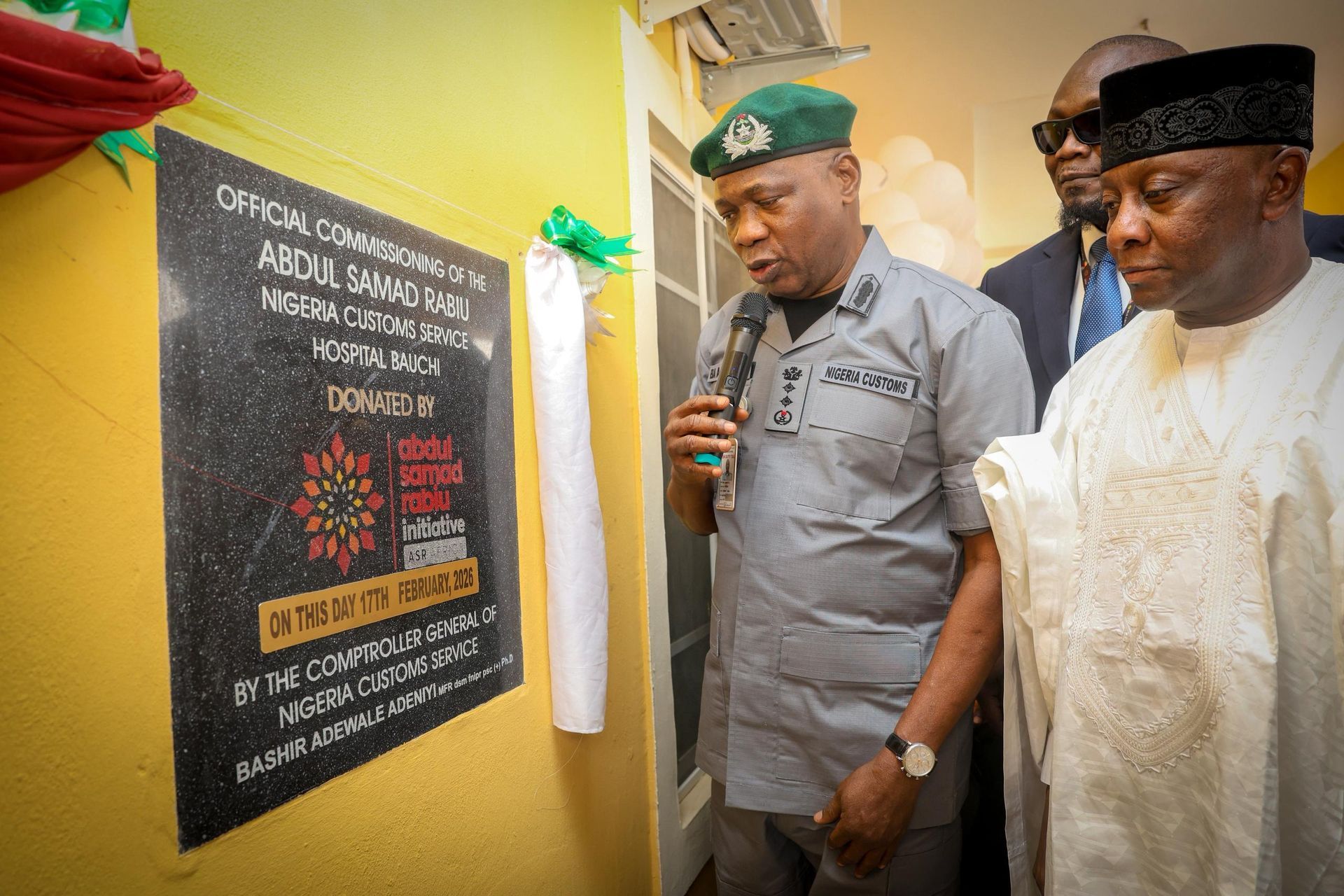
Gloria Odion, Maritime Reporter
The Comptroller-General of Customs, Adewale Adeniyi, on Tuesday, February 17, 2026, officially commissioned the Abdul Samad Rabiu / Nigeria Customs Service Hospital in Bauchi, a 60-bed healthcare facility constructed and donated by Abdul Samad Rabiu, Chairman of ASR Africa and Founder/Executive Chairman of BUA Group.
The hospital, delivered through the Abdul Samad Rabiu Africa Initiative, is expected to significantly expand healthcare access for Customs officers, their families and host communities across Zone ‘D’ and neighbouring states.
Describing the project as a strategic welfare investment, the CGC said the facility reflects the Service’s commitment to strengthening institutional capacity through improved personnel wellbeing.
“This commissioning is a clear statement that the NCS prioritises the health and welfare of its officers,” he stated.
“A modern Service requires not only technology and operational reforms, but also strong social infrastructure that supports those who serve.”
In his remarks, the Managing Director/CEO of ASR Africa, Dr Ubon Udoh, emphasised the intervention’s sustainability focus.
“ASR Africa is committed to impact-driven philanthropy,” he said. “Our partnership with the NCS demonstrates what can be achieved when private sector commitment aligns with institutional reform and clear developmental goals.”
Also delivering a message on behalf of the Executive Governor of Bauchi State, Senator Bala Mohammed, the Secretary to the State Government, Aminu Hammayo, described the commissioning as a boost to the state’s healthcare ecosystem.
“This facility will complement existing public health institutions and improve access to specialised services,” he said.
“It reflects the value of collaboration between government and responsible corporate entities.”
The hospital’s commissioning marks the culmination of a phased transformation that began in 2008 with the establishment of a basic health post at the Zone ‘D’ Headquarters, Bauchi.
It was subsequently upgraded to a clinic, and later a medical centre, before a 2023 partnership between the NCS and ASR Africa converted it into a 30-bed hospital, completed in April 2025.
Following a needs assessment, the CGC approved the remodelling and expansion of the facility into a 60-bed secondary healthcare facility with selected tertiary services.
Now equipped with seven clinical departments: Nursing Services, Obstetrics and Gynaecology, Pediatrics, Surgery, Internal Medicine, Pharmacy and Medical Laboratory, alongside Administrative and Health Information Management units, as well as Dental, Radiology and Nutrition units.
The hospital is projected to manage up to 300 patients per month during its first operational year.
Long-term expansion plans include advanced diagnostics such as CT scans and MRI, as well as specialised surgical procedures, positioning the facility as a referral centre across the North-East and parts of North-Central Nigeria.
Customs
Ahead of Customs’ paperless operations in June, Comptroller Onyeka declares Tin Can Customs trade enabler

Funso OLOJO, Editor
Barely few days after the Comptroller- General of Customs, Adewale Adeniyi, announced that the Customs will migrate to paperless operations in June, 2026, the Tin Can command of the Service has made an elaborate preparation to key into the digital platform.
Even though, the Customs High Command is yet to release the blue print for the take -off of the digital revolution in goods clearance, the Controller of Tin Can Customs, Comptroller Frank Onyeka, has declared that his command is ready to hit the ground running.
To this end, Comptroller Onyeka has declared Tin Can Island Customs as a trade enabler where seamless operations will be the order of the day.
While speaking with the maritime media on Tuesday, February 17th, 2026, Onyeka stated that as long as an importer or his agent makes an honest declaration and the consignment is not flagged, such goods will leave the customs control within the 48 hours clearance time being envisaged by the Customs under its paperless operations regime.
Comptroller Onyeka further disclosed that his command will aim at collecting collectable revenue instead of maximum revenue which often leaves no room for trader to handle logistics costs and other sundry charges.
“By focusing on collectable revenue, we ensure that the trader makes profit, return to the market and continues to contribute to the society.
“I want to be known as a trade enabler personified” Comptroller Onyeka enthused.
While making projection into the year 2026, the Customs chief said the command recorded a lot of positives in 2025 when it surpassed the revenue target for that year and when a record revenue collection of 26 billion was recorded in a single day, a feat that was unprecedented in the history of the command.
Onyeka said the command started the year 2026 on a good revenue trajectory with the collection of N145. 9bn in January, representing a 25.3 percent increase when compared to the N116.4billon collected in January 2025.
He acknowledged the support of the media for its “constructive reportage” which acted as a catalyst for the good performance of the command in 2025.
While soliciting for the continued support of journalists in 2026, Comptroller Onyeka said his officers have been well primed to confront the challenges ahead.
He dismissed the fears of possible network glitches which stakeholders expressed may hamper the success of the paperless operations, saying such eventuality will be surmounted just as the teething problems which plagued B’ Odogwu platform at take off were conquered.
“Despite the teething problems with B’Odogwu, we have recorded tremendous success, so we are ready for the paperless operations.
“There could be network issues but I want to urge the trading public to build capacity.
“With that, you can complete container clearance entirely online, with no physical contact with customs officers.
“If your declaration is not flagged, the process will be seamless, there will be no reason to come and see anyone.
“We cannot guarantee a perfect system from day one, but those challenges will not stop us.
” The more traders declare correctly and honestly, the smoother this process becomes for everyone,” he declared while advising importers to palletise their consignments.
It could be recalled that while launching the Customs’ One- Stop- Shop(OSS) on Friday, February 13th, 2026, the Comptroller- General of Customs, Adewale Adeniyi, disclosed that the Service is advancing toward a fully paperless customs environment, with the first phase of digital clearance and documentation processes scheduled for rollout by the end of the second quarter of 2026.
“This platform is a deliberate shift from fragmented interventions to coordinated governance, from discretion to data, and from isolated actions to collective responsibility,” Adeniyi had declared.
“Through this reform, we continue to build systems that support lawful trade, protect national interests and serve the economy with professionalism and integrity.” he concluded.
-

 Headlines3 months ago
Headlines3 months agoEx-NIWA boss, Oyebamiji, emerges most media-friendly CEO in maritime industry
-

 Headlines4 days ago
Headlines4 days agoFIFA sends Nigeria’s Super Eagles to 2026 World Cup, awards boardroom scoreline of 3 goals to nil against DR Congo
-
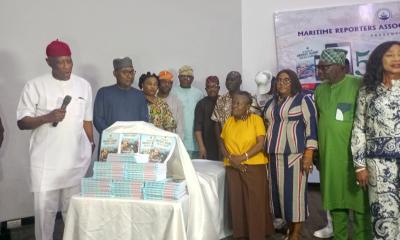
 Headlines3 months ago
Headlines3 months agoMARAN pulls industry’s stakeholders to unveil its iconic book on Maritime industry.
-

 Customs3 months ago
Customs3 months agoHow Comptroller Adenuga is raising revenue profile of Seme command, facilitating regional trade.
-
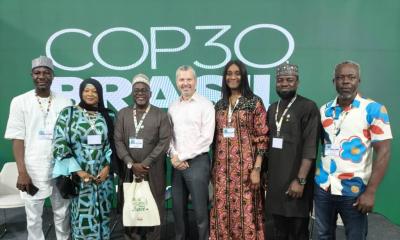
 Headlines3 months ago
Headlines3 months agoNigeria showcases readiness for compliance with IMO decarbonization policy at Brazil conference
-
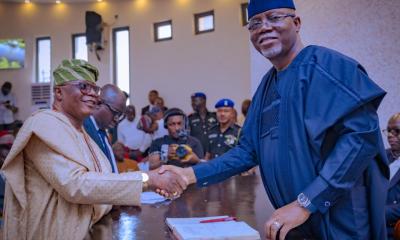
 Headlines3 months ago
Headlines3 months agoOndo govt inaugurates former NIMASA Director, Olu Aladenusi, as Special Aide on Marine and Blue Economy

